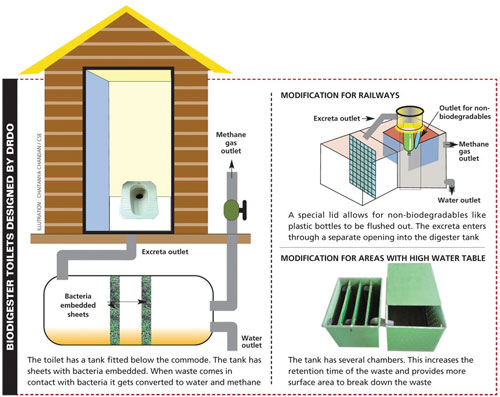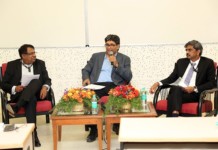Stink at railway stations may be bearable when Indian Railways installs DRDO’s Bio-Digester quickly. The technology is 100 percent maintenance-free and allows complete elimination of pathogens without requiring the night soil to be disposed through sewage line and septic tank.
Since the need for septic tanks and sewage lines has been eliminated in this technology, the bio-toilets can be installed and ready for use within just 48 hours, compared to two months for the conventional toilets and at 70 percent cheaper. While a regular toilet costs around Rs.100,000, a bio-toilet can be put up at just Rs.30,000.
The bio-digester requires only an initial one-time charging with anaerobic bacterial inoculums if it is in regular use. The bio-degradation of the night soil leads to generation of bio-gas which can be utilized for cooking. The clean odourless water extracted after bio-degradation can be recycled for irrigation.
Currently, DRDO bio-toilets are being widely utilized by the defence forces in remote locations. The Indian Railways signed a memorandum of understanding with the DRDO in 2010 to develop a bio-toilet for use in railway coaches to improve the environment in and around the railway infrastructure.
The bio-digester is a spin-off technology product developed by scientists from the DRDE, Gwalior, and Defence Research Laboratory (DRL), Tezpur, to treat biological wastes of soldiers serving in the high altitudes of Ladakh and Siachen. Since 2012, Indian Railways has started to transform all on-board toilets into bio-toilets. With an average 18 million people travelling by train every day, Indian Railways is a lifeline but its toilets are in a pitiful state.
Banka Bio-loos
Namita Banka, founder and CEO of COWE (Confederation of Women Entrepreneurs), Hyderabad, started Banka Bio-loo which is a women-led organization engaged in promoting and developing innovative environmentfriendly products and services for human waste management. Its main focus is to deal with the issue of open defecation. It manufactures ELOO (Eco loo) using bio-digester technology from DRDO. Banka BioLoo was the first to commercialize this technology, which could well meet the sanitation needs of millions of Indians who have no access to sanitation. She won the Cartier Women’s Initiative Awards 2013 for her initiative.








Since there is no officail document or a research paper on the comparision of the different toilet technologies – initial cost , advantages and disadvantages , user surveys .
There are many DRDO toilets which have failed as they are not used or the valve remains open and the bacteria dies
Very strange that India is going to spend 2 lac crores in the next 5 years -and 50% toilets built till today are not being used .
Are we looking at number of toilets or no of people who change their behaviour.
Pls let me know if there is a comparitive study on W/C with sewage system ,or with a Septic tank , DRDO Bio digester , Sulabh 2 pit model and Ecosan 2 pit model .